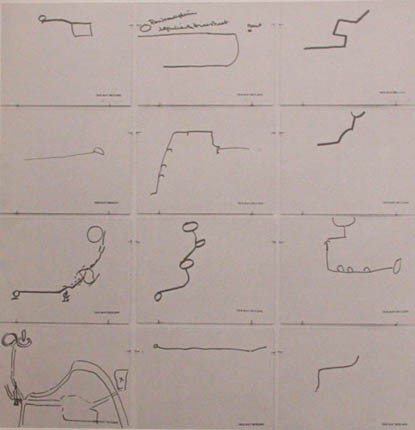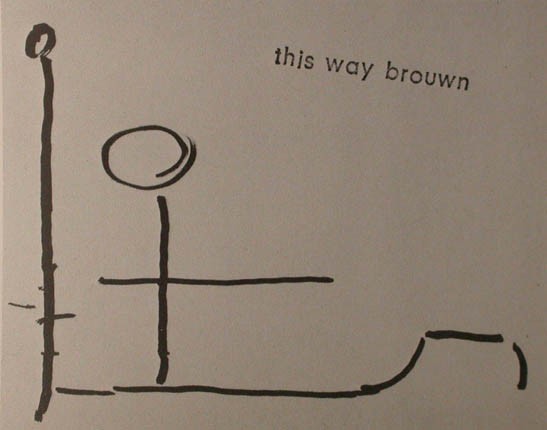Hit the road: Difference between revisions
Inge Hoonte (talk | contribs) (Created page with "[http://pzwart3.wdka.hro.nl/wiki/User:Inge_Hoonte/Essay ''<<< back''] In the oeuvre of Stanley Brouwn (1935 Paramaribo SME), the footstep plays a key role. A footstep is a perso...") |
Inge Hoonte (talk | contribs) No edit summary |
||
| Line 1: | Line 1: | ||
In the oeuvre of Stanley Brouwn (1935 Paramaribo SME), the footstep plays a key role. A footstep is a personal linear measure as opposed to the standardised meter: not one step is ever the same. Brouwn conveys this concept by creating works in which he presents the length of his strides in lines. ‘one step (11x)’, for example, shows 11 lines that all differ slightly from one another. He also produces works in which he involves the audience. In the 1960s, Brouwn asked passers-by to show him the way to a certain location and draw the route on a piece of paper for him. He marked the drawings with a stamp stating,"this way brouwn," signifying the title of the piece. (Van Abbe Museum, Eindhoven, 2007) | In the oeuvre of Stanley Brouwn (1935 Paramaribo SME), the footstep plays a key role. A footstep is a personal linear measure as opposed to the standardised meter: not one step is ever the same. Brouwn conveys this concept by creating works in which he presents the length of his strides in lines. ‘one step (11x)’, for example, shows 11 lines that all differ slightly from one another. He also produces works in which he involves the audience. In the 1960s, Brouwn asked passers-by to show him the way to a certain location and draw the route on a piece of paper for him. He marked the drawings with a stamp stating,"this way brouwn," signifying the title of the piece. (Van Abbe Museum, Eindhoven, 2007) | ||
[[File:brouwn.jpg]] [[File:08_brouwn.jpg]] | [[File:brouwn.jpg]] [[File:08_brouwn.jpg]] | ||
[http://pzwart3.wdka.hro.nl/wiki/User:Inge_Hoonte/Essay ''<<< back''] | |||
Latest revision as of 17:16, 10 December 2010
In the oeuvre of Stanley Brouwn (1935 Paramaribo SME), the footstep plays a key role. A footstep is a personal linear measure as opposed to the standardised meter: not one step is ever the same. Brouwn conveys this concept by creating works in which he presents the length of his strides in lines. ‘one step (11x)’, for example, shows 11 lines that all differ slightly from one another. He also produces works in which he involves the audience. In the 1960s, Brouwn asked passers-by to show him the way to a certain location and draw the route on a piece of paper for him. He marked the drawings with a stamp stating,"this way brouwn," signifying the title of the piece. (Van Abbe Museum, Eindhoven, 2007)


